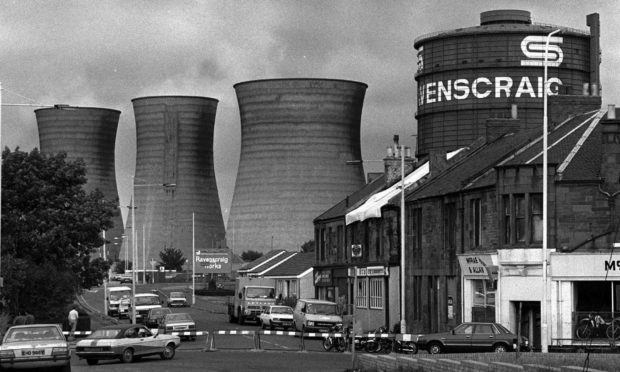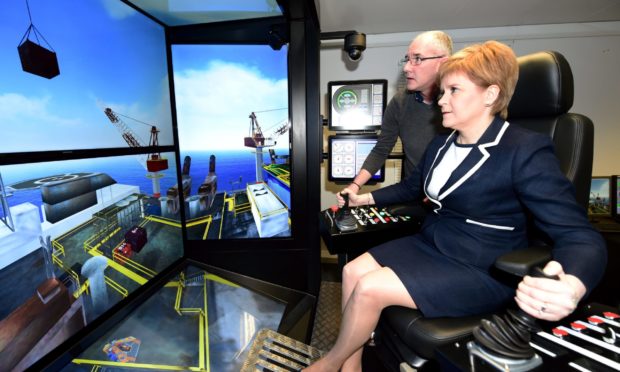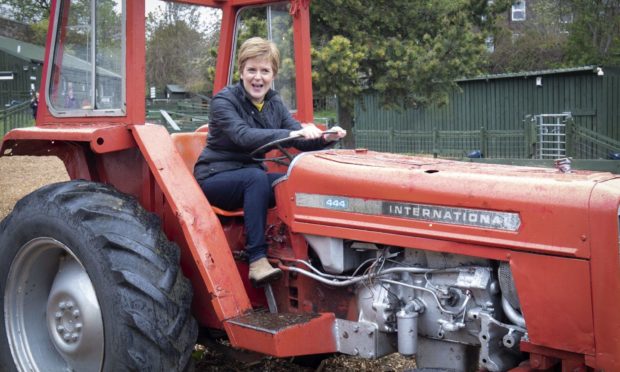Nicola Sturgeon has vowed to protect the north-east’s post-oil future from the kind of “devastation” caused by deindustrialisation when she was growing up.
The first minister said her memories of the demise of the coal and steel industries in the 1970s and 1980s made her “determined” to avoid repeating the same mistakes with the North Sea.
And she warned young climate activists that it was their generation who would pay the price if the transition away from fossil fuels was too fast.
Ms Sturgeon’s refusal to back an end to offshore exploration and extraction puts her at odds with the Scottish Greens, who have been touted as potential coalition partners for the SNP if it fails to win a majority at Thursday’s election.
In one of her last newspaper interviews before the polls open, the first minister also promised action to address concerns about the impact of holiday homes in rural areas, saying her party hoped to “find ways to tilt the balance” in favour of families.
She made the vow as she highlighted how important it was for her supporters to turn out and use both their votes to back the SNP in the north, saying “the Highlands could hold the keys to Holyrood”.
Voters in the north-east made clear their fears about the energy transition during extensive research carried out by Survation to inform our election coverage.
A poll of 2,047 people showed that more than a third of Scots listed the economy as one of the most important issues, with only health polling higher.
And focus group studies heard concerns that local communities could “end up like a coal mining village, when everyone moves to where the jobs are”.
‘Seared into my consciousness’
Amid calls to accelerate the end of the North Sea, Ms Sturgeon has previously spoken about the need for “difficult decisions” to be taken in the battle against climate change, and “big things” to confront in the next parliament.
But the SNP leader said she would not allow it to come at the expense of communities and livelihoods.
“I say it because it is seared into my consciousness,” she said.
“I grew up in Ayrshire in the 1970s and 1980s, and I saw and remember first-hand the devastation that is done to people and communities when governments don’t take care to take people along in a transition – the deindustrialisation that happened under the Thatcher governments, and the way in which, at that time, coal and steel communities were just left behind.
“If I think about the area I grew up in, there are people there today who are still paying the price for that, and bearing the legacy for that, and we mustn’t do that with the transition to net zero, that’s why the justice of the transition is so important.
“I think all of us have to be determined that that will not happen.”
Oil and gas exploration
Ms Sturgeon was asked about the position of the Scottish Greens, who want to end exploration and government support for the sector.
“I understand why people say we’ve got to end oil and gas exploration and extraction now, but we’ve also got to make sure our energy needs are catered for,” she said.
“If we just basically draw a line and take a sort of axe to oil and gas right now, whatever the climate motivations of that might be, all we will end up doing is making ourselves more dependent on imported oil and gas.
“There’s so many pieces of this jigsaw that we’ve got to get into sync if this is to work.”
Ms Sturgeon added: “There are few people in politics in Scotland more committed to the transition to net zero than me – I feel really strongly that we have to live up to that responsibility.
“But we’ve got to do it properly, because if we don’t do it properly then the same young people that, rightly, are pushing politicians to be really bold in terms of climate will be the young people that we leave behind in terms of jobs and opportunities.”
The Survation research for our election manifesto also found concerns about an escalating housing crisis in areas like the Highlands and Islands, where local families can often be priced out of property markets by buyers seeking holiday homes.
Ms Sturgeon said: “We’ve got a good record on new affordable housing, and we’ve got a massive ambition to push forward on that in the next parliament, and over the next decade, the 100,000 affordable homes commitment, which is important to give families the homes they need, but also it’s a massive economic policy too.
“You know we want Scotland to be a magnet for tourism and people visiting but, particularly in communities where there is pressure on housing, where there is pressure on depopulation, we’ve got to make sure that houses are there for people to live in and not just lying empty for much of the year and used as holiday homes.
“So we want to kind of tilt the balance, and find ways to tilt the balance in favour of families having homes to live in.”


